Kordale Lewis has just returned from a late-night run to Target with his daughters, Desmiray, 10, and Maliyah, 9, and their large, grandly furnished home in the Atlanta suburbs is humming in anticipation of an imminent family trip to Paris. The girls have bought some accessories, and Kaleb Anthony, Kordale’s partner, is taking an inventory.
“What are you dressing them in?” he asks. Kordale bought pink pants to go with Maliyah’s black flats and gray sweater. Kaleb is dubious: “Black flats with light colors?” Kordale, ignoring the provocation, says, “Desmiray is wearing black leggings with that sweater and her brown heels.” Another grimace from Kaleb. “Black on top of brown?” Kordale looks flustered.
Behind us, Desmiray is practicing a model’s snaking walk in her heels. Her fathers enrolled her in the Barbizon Modeling School and entertain high hopes for her future career. She and Maliyah recently received video cameras in order to blog their journey into adolescence, and had trailed each other around Target recording stray observations as Kordale kept an eye on Desmiray’s gait. “Sweetheart, heel over toe every time you walk,” he’d instructed.

Neither Kordale nor Kaleb has been to Europe, and this will be no ordinary family vacation. The two men and their four children are attending Paris Fashion Week as guests of Acne Studios, the avant-garde, often precious, Swedish brand that tapped them as the face of its latest campaign after spotting them on Instagram. The Acne images were shot by fashion faves Inez & Vinoodh, who have photographed Lady Gaga and President Obama, among others. One shot shows the family in the master bedroom, Kaleb resting on the bed, shirt pulled up around his neck to reveal his buff chest and tattoos, while Kordale sits in the foreground, balancing their youngest child, Caleb IV, on his shoulder. Their three other children, Desmiray, Maliyah, and Kordale Jr., pose on the bed behind Kaleb. It is not their first advertising campaign—in 2015, they were featured in a popular digital video for Nikon cameras—and the couple are determined to make sure it won’t be their last.
Were they a straight white family, no one would bat an eyelid, but two black gay men clowning around with their kids is still an arresting image in 2017. When Kordale and Kaleb casually posted a selfie to Instagram in January 2014, in which they captured a morning ritual of brushing their daughters’ hair for school, they created the kind of viral moment that advertisers spend tens of thousands concocting, often without success. At a time when Black Lives Matter was underscoring a seemingly endless epidemic of police killings of unarmed black men, an image of black gay fathers in a tender moment with their daughters had a particularly poignant resonance, demonstrating how rare such images are in a culture in which black men are routinely demonized as threats to, not emblems of, the American family. It didn’t hurt that Kordale and Kaleb were also easy on the eyes, and looked like fathers who knew how to enjoy each other’s company after the lights were out.
Flash forward almost four years, and KordalenKaleb, to use their popular Instagram handle, are sitting around their spacious kitchen sharing pizzas with the kids, and asking if I’ve heard of the hotel they’re staying at in Paris. A dog runs around, alert to the high energy as Kaleb preps his hookah with mojito-flavored tobacco and Kordale plays with Instagram filters for a selfie of the three of us.

Yet, against the upbeat fairy tale of the couple’s social media, the story that Kordale tells of his childhood makes his success as a father all the more affecting. And it helps shine a light on the love, energy, and sheer tenacity he’s invested with Kaleb in building a home for their children. “You don’t look at your life as something interesting until other people tell you it’s interesting,” says Kordale as he recounts his fractured childhood. “I just thought that I was going through shit and I would tell myself, ‘This will all be over one day. Keep on going.’” The “shit” he refers to was his drug-addicted mother and a childhood spent in a series of foster homes, culminating in a suicide attempt at 13. Through his teens he was in jail more often than he can count, usually for violating probation—which can mean anything from possessing pot to riding on a stolen street sweeper, as he once did for a lark. These are things white boys do with impunity, but in Dubuque, Iowa, where he reunited with his mother when he was 15, the cops only targeted black men. “I knew I’d never be as great as I could be because the police were designed to oppress people in that town, bothering minorities all the time, finding any reason to lock them up, and once they found a reason to indict them for a small infraction, they were going to send ’em to prison.”
After being expelled from school for beating up a classmate who called him the N word, Kordale found himself at an alternative high school, “high as hell” on Adderall, and sleeping around with girls because that was what a young man was supposed to do. He met Destany Marie Davidson, the mother of his children, in a nightclub. A year later, when he was 16, Destany gave birth to Desmiray, and Kordale had to turn his straight role-play into something more serious. “I always knew I was gay—I knew I liked men,” he says. “I just repressed it. It was too scary a thought to act on it in a small town.” He and Destany had two more children in quick succession before it was clear something was wrong. “Before Kordale Jr. was born, I was telling her, ‘I want you to try this [dildo] on me sexually,’ and she was, like, ‘Ugh, that’s so nasty, so gay,’ this and that.” He pauses. “You really going to put that in the article?” He laughs. “I don’t really care,” he says. “Let me tell you something—sex is tangible to everybody.”
As we talk into the descending gloom of the evening, Kordale lowers his voice when the children approach, or pauses to check on Desmiray’s grades (“Is this 100? Look at you! Keep practicing—get straight A’s”) or to pacify Caleb IV, who is entering his noisy stage. Although there are photos of his mother and father around the house, he is not yet ready to tell the children why they never get to see their grandfather. Kordale was 13 when his aunt, in a fit of pique, told him that he was the son of a double-murderer, prompting his suicide attempt. He pulls up his father’s mugshot on his laptop, and suddenly, the happy family he’s created takes on a different hue—it’s a more profound achievement. “I want to know the story of who my daddy killed, and why, because I want to reach out to the families and offer an apology,” he says. “I’ve seen mothers bury their kids—it’s painful. The idea that someone so close to me, who I’ve never really met, done that, you know?” He trails off. “I’m the type of son that would turn him in, because if something like that happened to me, I’d want the same respect from the family.”

Kaleb was studying engineering at Jackson State University in Mississippi in 2009 when he sent a Facebook message to Kordale, a suggested friend. Having separated from Destany a few years earlier, Kordale was living in Atlanta, figuring out what he really wanted. The two were a match of opposites. Kaleb, from a close-knit family, represented the white-picket-fence fantasy that Kordale had long pined for. Each week for six weeks, he drove the 380 miles from Jackson to Atlanta so they could be together. Before long, Kordale moved up to Jackson to live with Kaleb.
“Kordale is the reason I’m out,” Kaleb recalls. “It was Christmas, and he’d been telling me he was going home, and I said, ‘What about Christmas?’ and he was like, ‘That’s just another day.’ ” Kaleb insisted he stay with him for the holiday. When his father visited and questioned the bedroom arrangements, Kaleb floundered until Kordale stepped forward. “Kordale blurted out, ‘Before you ask any more questions, your son has something to tell you,’ so that’s when I told my parents. My dad was like, ‘I’m kind of disappointed,’ and I thought, OK, here we go—one of those dads who doesn’t like gay people, and then he said, ‘I just thought we were a lot closer and that you could have come and talked to me about this.’ ”
It would be disingenuous to say they’ve been a happy family ever since—there was a brief split in 2015—but the two are sanguine about the challenges, and aware that they can’t get too caught up in the whirlwind of celebrity that has turned them into a glossy emblem of black gay families. They are an idealized version of the America so forcefully repudiated by Donald Trump, but they are also a repudiation of his America, a manifestation of the better America the country has the potential to be. As they escort me around their house with its baroque decor (inspired, Kordale says, by The Real Housewives of Atlanta), he shows a real pride in the home they have built, the bathrooms en suite, the flat-screen TVs. What better than these material trappings of success to rebuke to those who find the idea of a black queer family anathema? “A lot of people don’t agree with it,” says Destany, who moved to Atlanta three years ago, and now visits the house most nights and takes the children on weekends. “They say, ‘How do you let your kids move in with two men?’ ” Does she harbor any regrets about sharing custody of her children? “Sometimes I do,” she says. “Sometimes I feel like all my kids should be at home with me, but that’s just a mother’s feeling—they wouldn’t understand.”
“I understand it,” Kaleb softly says.
“I don’t understand it,” says Kordale with stubborn mischievousness.
What about living together—Destany and Kordale and Kaleb? Maybe they could change the Instagram to KordalenKalebnDestany. They all shriek in unison. “Hell, no,” says Destany and Kordale, before Kaleb—the peacemaker—suggests that for that to work they’d need to build a second house for Destany and live on several acres. And for that, they may need another advertising gig. Kordale has already mapped it out. “I picture our family doing a Lexus commercial around Christmastime, with our son, who will be fully walking by then—and maybe the dog!” Kordale, who has built his life through grit and determination, knows they have a powerful brand. “That will be a viral moment for Lexus for months to come, I’m telling you,” he says. “If it was any other family it would just be another commercial. I hate to say it, but it’s the truth—I feel we have the spark, for whatever reason.” Kaleb nods and says, “We need to get us an agent.”


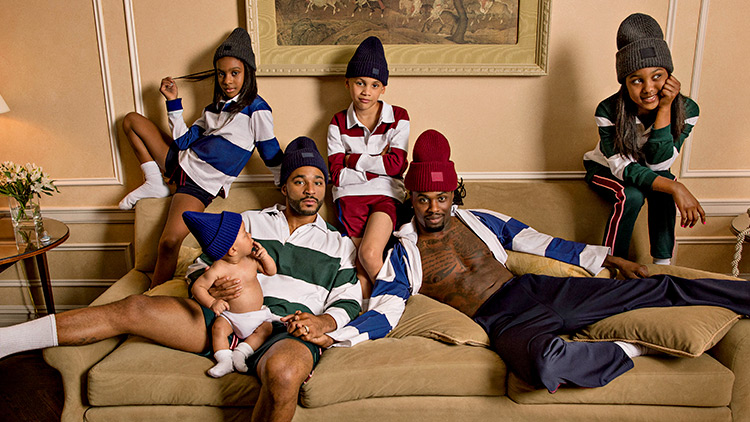


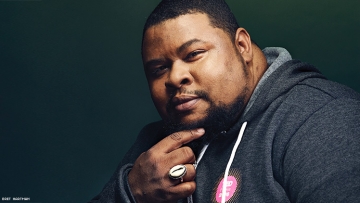
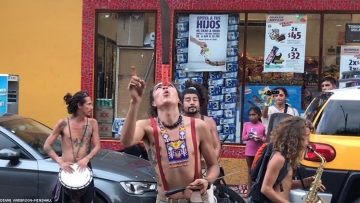
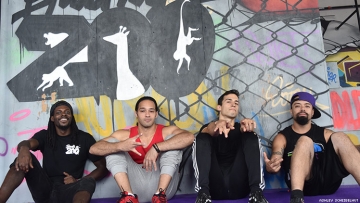
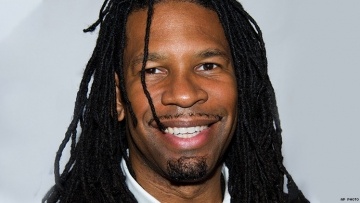






READER COMMENTS (